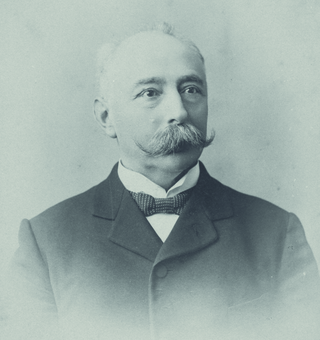
The Anti-Revolutionary Party was a Protestant conservative and Christian democratic political party in the Netherlands. The party was founded in 1879 by Abraham Kuyper, a neo-Calvinist theologian and minister who served as Prime Minister between 1901 and 1905. In 1980 the party merged with the Catholic People's Party (KVP) and the Christian Historical Union (CHU) to form the Christian Democratic Appeal (CDA).
Liberalism in the Netherlands started as an anti-monarchical effort spearheaded by the Dutch statesman Thorbecke, who almost single-handedly wrote the 1848 Constitution of the Netherlands that turned the country into a constitutional monarchy.

The Free-thinking Democratic League was a progressive liberal political party in the Netherlands. Established in 1901, it played a relatively large role in Dutch politics, supplying one Prime Minister, Wim Schermerhorn. The League is a predecessor of two of the major Dutch political parties, the conservative liberal People's Party for Freedom and Democracy (VVD) and the social democratic Labour Party (PvdA). The social liberal Democrats 66 also claims that it and the VDB are ideologically connected.

The Christian Historical Union was a Protestant Christian democratic political party in the Netherlands. The CHU is one of the predecessors of the Christian Democratic Appeal (CDA), into which it merged in September 1980.

Radicalism was a political movement representing the leftward flank of liberalism between the late 18th and early 20th century. Certain aspects of the movement were precursors to modern-day movements such as social liberalism, social democracy, civil libertarianism, and modern progressivism. This ideology is commonly referred to as "radicalism" but is sometimes referred to as radical liberalism, or classical radicalism, to distinguish it from radical politics. Its earliest beginnings are to be found during the English Civil War with the Levellers and later the Radical Whigs.

The Den Uyl cabinet was the executive branch of the Dutch Government from 11 May 1973 until 19 December 1977. The cabinet was formed by the social-democratic Labour Party (PvdA), the christian-democratic Catholic People's Party (KVP) and Anti-Revolutionary Party (ARP), the progressive Political Party of Radicals (PPR) and the social-liberal Democrats 66 (D'66) after the election of 1972. The cabinet was a Centre-left grand coalition and had a substantial majority in the House of Representatives with Labour Leader Joop den Uyl serving as Prime Minister. Prominent Catholic politician Dries van Agt, the Minister of Justice from the previous cabinet, served as Deputy Prime Minister until his resignation. Prominent Protestant politician Gaius de Gaay Fortman the Minister of the Interior assumed the office of Deputy Prime Minister on 8 September 1977.

The Social Democratic Workers' Party was a Dutch socialist political party existing from 1894 to 1946. Originating from a split in the prior Social Democratic League, the party was a predecessor of the current social democratic Labour Party (Netherlands).

The League of Free Liberals was a Dutch classical liberal political party and a predecessor of the Liberal State Party which is historically linked to the People's Party for Freedom and Democracy, the major Dutch liberal party. The party's name League of Free Liberals was supposed to convey that the party was not a classical political party, with party discipline and a centralised organisation but a league of independent MPs. The conservative liberals were called free liberals before they had founded a separate party.
The Liberal State Party, "the Freedom League", was a conservative liberal political party in the Netherlands from 1921 to 1948. It is historically linked to the People's Party for Freedom and Democracy (VVD), a major Dutch political party.

The Liberal Union was a conservative liberal and progressive liberal political party in the Netherlands. A major party in its time, the Liberals were one of the historic predecessors of the Liberal State Party, and therefore of the People's Party for Freedom and Democracy.

The Social Democratic League was a socialist political party in the Netherlands. Founded in 1881, the SDB was the first socialist party to enter the House of Representatives.

The Middenstandspartij was a Dutch political party representing middle class interests. It played only a marginal role in Dutch politics.

The Economic League was a liberal political party in the Netherlands from 1917 to 1921.

The Christian Historical Voters' League was a conservative protestant political party in the Netherlands.

The League of electoral associations on Christian Historical foundation in the province of Friesland, informally called the Frisian League is a conservative Reformed political party in the Netherlands. The Frisian League is historically linked to the Christian Democratic Appeal, which is currently one of the major parties of the Netherlands.
This article gives an overview of socialism in the Netherlands, including communism and social democracy. It is limited to communist, socialist, social democratic, and democratic socialist parties with substantial support, mainly proved by having had a representation in parliament. The sign ⇒ means a reference to another party in that scheme.

This article gives an overview of Christian democracy in the Netherlands, which is also called confessionalism, including political Catholicism and Protestantism.

Carel Victor Gerritsen was a Dutch politician known for his radical views. The husband of Aletta Jacobs, he was a proponent of open government, fair wages and birth control. He served as an alderman in Amsterdam and a representative in the States of North Holland. He helped found many radical organisations in the Netherlands including the Neo-Malthusian League, the Radical League and the Free-thinking Democratic League.

Hendrik Pieter "Henri" Marchant was a Dutch politician who co-founded the Free-thinking Democratic League (VDB) and served as a member of the House of Representatives from 1900 until 1933, after which he was Minister of Education, Arts, and Science until 1935.

The Democratic Party was a left liberal political party in the Netherlands. It was founded in 1921 by Jan Ernst Heeres when the Liberal Union, of which he was president, failed to merge with the Free-thinking Democratic League (VDB), and instead merged with the more conservative League of Free Liberals and Economic League.











